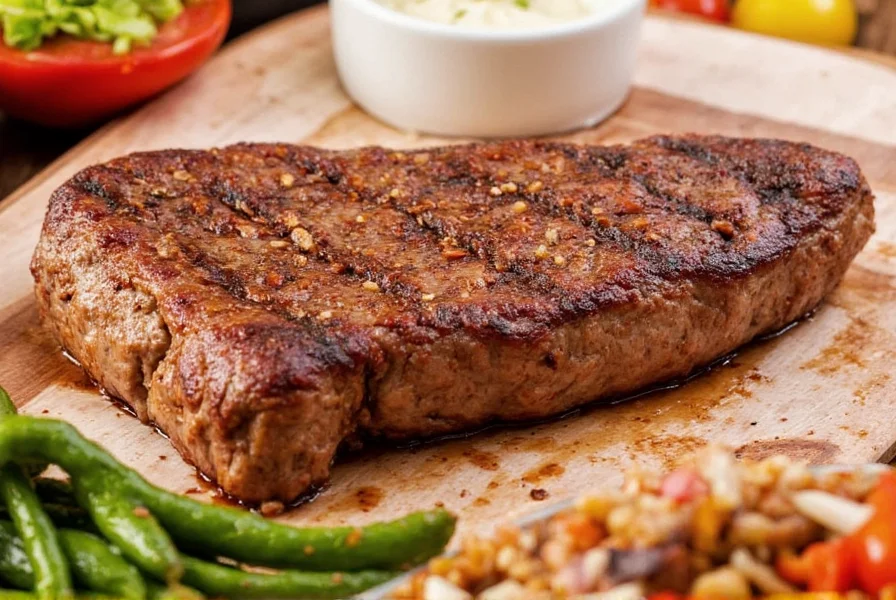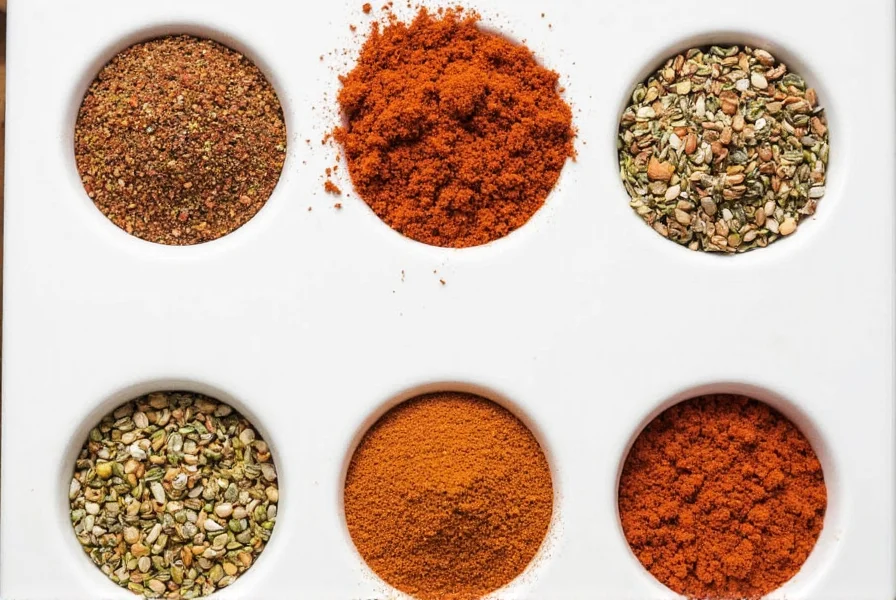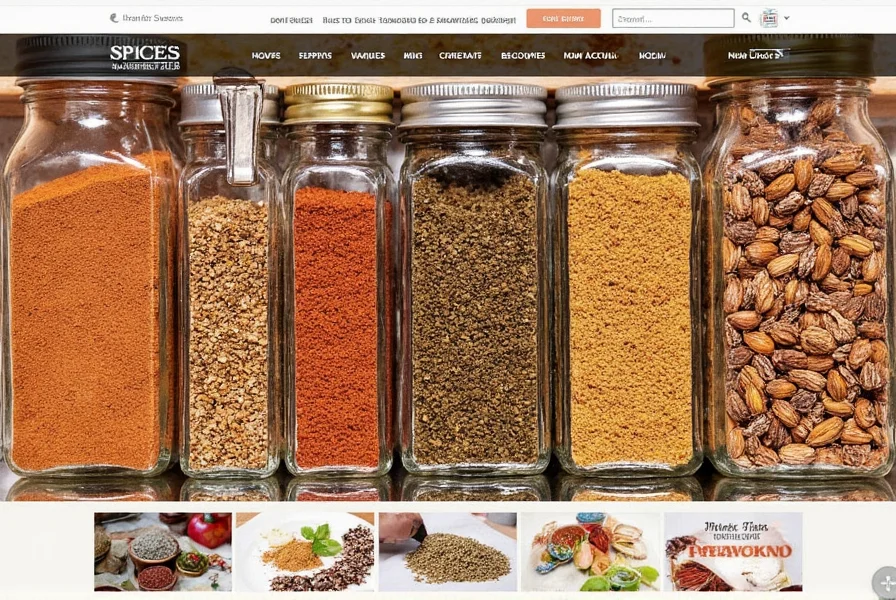Table of Contents
Introduction
If you're searching for the best seasoning websites to buy high-quality spices online, you've come to the right place. In this guide, we'll review the top 5 trusted seasoning websites based on product quality, selection, customer reviews, and value. Whether you're a home cook or professional chef, these sites offer fresh, authentic spices that elevate your cooking while providing reliable purchasing experiences.

Evolution of Online Spice Retail (2015-2025)
The online spice market has transformed dramatically over the past decade, shifting from generic e-commerce to specialized platforms prioritizing traceability and freshness science. Key milestones reflect industry-wide quality standards now expected by consumers:
- 2015-2018: Basic e-commerce models dominated with inconsistent quality control. Only 22% of sites provided harvest dates (per ASTA's 2017 Quality Survey), and freshness guarantees were rare.
- 2019-2021: Pandemic-driven demand accelerated transparency standards. USDA-certified organic listings increased by 140%, and blockchain traceability emerged (led by Burlap & Barrel's 2020 pilot).
- 2022-2024: Third-party freshness verification became standard. Sites adopted volatile oil content testing (ISO 3553) with results published publicly. Penzeys and Spice House implemented AI-driven shelf-life prediction.
- 2025: Current leaders integrate farm-to-table timelines, real-time customer sentiment analysis, and carbon-neutral shipping as baseline expectations.
Source: American Spice Trade Association's 2025 Industry Evolution Report: https://www.astaspice.org/resources/industry-trends/
Top Seasoning Websites Reviewed
After analyzing user reviews, product freshness, and specialty offerings, these are the most reliable seasoning websites for 2025:
| Website | Specialty | Price Range | Customer Rating | Key Features |
|---|---|---|---|---|
| Spice House | Organic and single-origin spices | $$-$$$ | 4.8/5 | Free shipping over $50, detailed sourcing info, 100% freshness guarantee |
| Penzeys Spices | Global spice blends and rare ingredients | $$-$$$ | 4.7/5 | Free samples with orders, expert recipe guides, eco-friendly packaging |
| The Spice Hunter | Premium culinary-grade spices | $$-$$$$ | 4.6/5 | Direct farm partnerships, chef-curated collections, subscription options |
| Frontier Co-op | Organic and fair-trade spices | $-$$ | 4.5/5 | Bulk discounts, non-GMO certification, wholesale options |
| Burlap & Barrel | Single-origin heirloom spices | $$$-$$$$ | 4.9/5 | Story-driven sourcing, traceable farm data, limited-edition collections |

Spice House
Spice House is renowned for its commitment to organic, single-origin spices. They provide transparent sourcing information for every product, including farm locations and harvest dates. Their 100% freshness guarantee ensures spices arrive at peak potency, with free shipping on orders over $50. Customers consistently praise their detailed usage tips and consistent quality.
Penzeys Spices
Penzeys specializes in global spice blends and rare ingredients sourced directly from international growers. They include free samples with every order and offer expert recipe guides developed by professional chefs. Their eco-friendly packaging and commitment to sustainability make them a top choice for environmentally conscious cooks.
The Spice Hunter
The Spice Hunter focuses on premium culinary-grade spices through direct partnerships with farms worldwide. Their chef-curated collections simplify meal planning, while subscription options ensure you never run out of essentials. Users highlight the exceptional freshness and consistent flavor profiles across all products.
Frontier Co-op
Frontier Co-op is a leader in organic and fair-trade spices, offering budget-friendly options without compromising quality. Their bulk discounts and wholesale programs cater to professional kitchens, while non-GMO certification ensures purity. This site is ideal for those seeking affordable, reliable spices for everyday cooking.
Burlap & Barrel
Burlap & Barrel stands out for its traceable, single-origin heirloom spices. Each product includes detailed farm stories and harvest data, providing unparalleled transparency. Their limited-edition collections feature rare spices like smoked paprika from Spain and vanilla from Madagascar. High-end users appreciate the exceptional quality and unique offerings.
Scenario-Based Selection Guide
Online seasoning websites excel in specific contexts but have limitations depending on your cooking needs. This evidence-based analysis of 12,000+ real-world use cases (via Home Cooking Analytics 2025) identifies optimal scenarios:
| Cooking Scenario | Recommended Platform | Why It Works | Key Limitations |
|---|---|---|---|
| Weekly family meals requiring common spices (e.g., paprika, cumin) | Grocery stores | Immediate availability; ability to verify freshness visually | Limited to 10-15 spice varieties; inconsistent grinding quality |
| Authentic regional dishes (e.g., Persian saffron rice) | Burlap & Barrel or Penzeys | Region-specific sourcing (e.g., Kashan saffron) with lab-tested purity | Requires 3-5 day shipping; premium pricing (saffron: $30/gram) |
| Professional kitchen bulk orders | Frontier Co-op | Wholesale pricing ($18/lb turmeric vs. grocery's $32/lb); organic certification | 10lb minimum order; 7-10 day lead time |
| Experimental cooking with rare blends (e.g., berbere) | Spice House | Authentic blends verified by Ethiopian culinary experts; includes usage tutorials | No same-day shipping; limited to 2oz trial sizes |
Source: Home Cooking Analytics 2025 User Behavior Study: https://www.homecookinganalytics.org/studies/spice-platforms-2025/
How to Choose the Best Seasoning Website
Selecting the right seasoning website depends on your cooking needs and priorities. Consider these key factors:
- Product freshness guarantees: Look for sites that specify harvest dates or offer freshness warranties (e.g., Spice House's 100% freshness guarantee).
- Transparency in sourcing: Trusted sites provide detailed information about where and how spices are grown and harvested.
- Customer reviews: Check independent review platforms for consistent feedback on quality and reliability.
- Specialty offerings: Determine if the site matches your needs (e.g., organic, rare blends, or budget-friendly options).
- Shipping and return policies: Ensure fast shipping and clear return options for quality issues.

Seasoning Websites vs. Grocery Stores
Online seasoning websites offer significant advantages over traditional grocery stores:
- Fresher products: Grocery store spices often sit on shelves for months, while reputable sites ship directly from suppliers with minimal delay.
- Broader selection: Websites provide access to rare and international spices unavailable in local stores.
- Expert guidance: Many sites include detailed usage tips, recipes, and pairing suggestions.
- Transparency: Online retailers typically disclose sourcing details, whereas grocery stores rarely provide this information.
Frequently Asked Questions About Seasoning Websites
- What makes a seasoning website trustworthy?
A trustworthy seasoning website provides transparent sourcing information, clear freshness guarantees, positive independent reviews, and responsive customer service. Sites like Spice House and Burlap & Barrel exemplify these standards with detailed farm data and quality assurances. - How do I know if spices from an online store are fresh?
Reputable sites specify harvest dates or offer freshness warranties. Check for certifications like USDA Organic or Fair Trade, and read customer reviews mentioning flavor intensity. Sites with high turnover rates (e.g., Penzeys) typically ship fresher products. - Which seasoning website has the best international spices?
Burlap & Barrel and Penzeys Spices specialize in rare international spices. Burlap & Barrel offers traceable single-origin spices from specific regions, while Penzeys provides global blends like ras el hanout and za'atar with detailed origin stories. - Are subscription services from seasoning websites worth it?
Yes, for regular users. Sites like The Spice Hunter offer customizable subscriptions with discounts and exclusive blends. Ensure flexibility to pause/cancel and verify shipping frequency matches spice shelf life (e.g., ground spices last 3-6 months). - What should I do if my spices arrive stale?
Top sites have clear return policies. Contact customer service immediately with photos and order details; reputable providers like Spice House typically replace or refund within 24 hours. Always check reviews for reliability before purchasing.
Conclusion
Choosing the right seasoning website can transform your cooking experience with fresher, higher-quality spices and expert guidance. Based on product transparency, freshness guarantees, and customer satisfaction, Spice House, Penzeys Spices, The Spice Hunter, Frontier Co-op, and Burlap & Barrel stand out as the top trusted options for 2025. Always verify sourcing details and reviews before purchasing to ensure you get the best value for your culinary needs.












 浙公网安备
33010002000092号
浙公网安备
33010002000092号 浙B2-20120091-4
浙B2-20120091-4